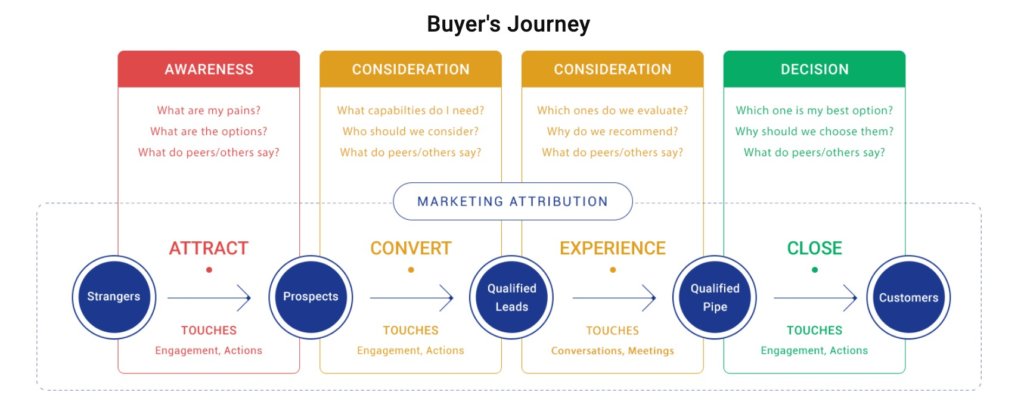7 Pitfalls to Avoid for B2B Marketing Attribution

B2B marketing attribution is critical for knowing which of your marketing efforts are driving results. Without it, you may be spending money on the wrong marketing channels and missing out on key insights.
But here’s the challenge…
Attribution in B2B marketing can be tricky. Long sales cycles, multiple touchpoints, and complex customer journeys make it hard to track what’s working. This is especially true for businesses trying to manage top-of-the-funnel campaigns and correctly assign credits across different channels.
The good news?
In this article, you’ll learn about common B2B marketing attribution mistakes and how to avoid them. We’ll show you simple, actionable steps to help you optimize your strategy and ensure you’re tracking every touchpoint. By applying these best practices, you’ll improve your conversion rates and meet your business goals.
What is B2B marketing attribution?
B2B marketing attribution is a system of determining which marketing touchpoints lead to a conversion by bringing together, transforming, and modeling copious amounts of data. It helps businesses connect marketing and sales data across all channels and includes B2B attribution methods like account-level attribution to track the effectiveness of each interaction.

Key Metrics for Measuring Attribution
When measuring attribution in marketing, tracking the right metrics is essential. Key attribution metrics include:
- First-touch attribution: This metric shows which marketing effort brought the visitor to your site initially.
- Last-touch attribution: This measures the final interaction before a conversion, showing the most impactful action.
- Multi-touch attribution: This measurement gives credit to all touchpoints in the customer journey, providing a comprehensive view of which channels influenced the buyer.
These attribution metrics help businesses understand the effectiveness of their marketing efforts and optimize their strategies.
How to Build a B2B Marketing Attribution Model
Building a B2B marketing attribution model might seem tricky, but it’s crucial for understanding which of your marketing efforts lead to conversions. A well-designed model helps you track the impact of each touchpoint on your conversion rates and overall business goals.
Here’s how you can do it:
1. Identify Your Goals
Start by asking, “What’s my main focus?” Are you trying to improve top-of-the-funnel engagement (attracting new leads) or closing more sales? Your business goals will guide the type of attribution model you need.
Tools: Use tools like Google Analytics or HubSpot to track different stages of the funnel and measure how each stage performs.
2. Map the Customer Journey
Visualize the steps your customers take from awareness to conversion. This means tracking every interaction, whether it’s through social media, email, paid ads, or even webinars. Collaboration with your sales team is key to understanding how these touchpoints work together.
Tools: Platforms like Segment, Mixpanel, or Hotjar can help track and visualize your customers’ journey across different channels. For B2B attribution, tools like Marketo or Pardot integrate well with your CRM, giving insights into marketing and sales data together.
3. Choose the Right Attribution Model
You need to decide whether to use single-touch attribution (which credits only the first or last interaction) or multi-touch attribution (which spreads credit across multiple interactions). For most B2B marketers, multi-channel attribution works best because it assigns credit to every touchpoint that leads to a conversion.
Tools: Platforms like Google Analytics 360, HubSpot, and Ruler Analytics offer flexible attribution models, allowing you to choose the one that fits your strategy.
4. Assign Credits to Touchpoints
After choosing a model, you need to decide how much credit each touchpoint gets. For example, time decay attribution gives more credit to touchpoints that occur closer to the final sale, while position-based attribution gives more weight to the first and last interactions.
Tools: Use tools like Google Ads, Adobe Analytics, or Attribution App to adjust credit assignment based on your chosen model. These tools help you customize how credits are assigned for better accuracy in your reporting.
5. Use Data to Optimize
Once your model is set up, use data from your attribution tools to analyze the performance of each touchpoint. Are certain channels driving more conversions than others?
Use this data to refine your marketing automation and reallocate your budget to the best-performing channels.
Tools: Power BI, Tableau, or Google Data Studio are great for visualizing data and optimizing your strategy. Also, use B2B marketing attribution software like Bizible or Terminus for deeper analysis and integration with your marketing and sales platforms.
Why is correct B2B marketing attribution important?
Correct B2B marketing attribution is important because it provides more insight into the buyer’s journey, helping B2B marketers capture nearly every touchpoint.
This allows them to optimize their marketing budget allocation and guide decision-making. Most marketers use six or more tools to collect performance data, making proper attribution essential for accurately tracking and improving marketing efforts.
A study by IDG Connect found that the increasing number of marketing channels and separate tools makes it challenging for marketers to track performance effectively.
Here’s what the survey revealed:
- 78% of companies are committed to deploying cross-channel attribution.
- Most marketers use six or more different tools to collect performance data.
- 59% said that accurate data collection and centralization is their biggest challenge.
The main barriers to adopting effective B2B marketing attribution are:
- Cost justification (70%)
- Lack of appropriate skills on the marketing team (56%)
- Integration with existing measurement systems (48%)
These results highlight the importance of using reliable B2B marketing attribution software that not only tracks performance across channels but also provides actionable insights.
Platforms like Trendemon can help B2B sellers overcome these challenges by offering data-driven insights into marketing automation, ensuring accurate B2B marketing analytics for every touchpoint.
By incorporating a powerful attribution model, businesses can finally get a clear picture of their complex customer journeys and optimize their marketing strategies for better results.

7 B2B Marketing Attribution Mistakes (and How to Fix Them)
1. Guessing Which Content Converts
Most marketers just assume their content is driving results. “Our blog posts are getting a ton of views—must be working, right?”
Wrong.
Views don’t always equal conversions, and if you’re not tracking what’s really working, you’re just throwing spaghetti at the wall.
Let me give you an example: One SaaS company was proud of their in-depth blog posts. They assumed readers were devouring every word.
But when they used Hotjar, they found most people stopped reading halfway through. They pivoted to shorter, more actionable posts and saw a 20% jump in conversions.
Fix it:
Use tools like Hotjar or Crazy Egg to figure out where people stop engaging. Then focus on content that holds their attention and gets them to take action.

2. Using the Wrong Attribution Model
If you’re still using a single-touch attribution model, you’re leaving out most of the customer journey.
Seriously.
Here’s an example: A B2B company was crediting only the final touchpoint—the demo request form.
But when they switched to multi-touch attribution in Google Analytics 360, they saw that webinars and email nurture campaigns were playing a huge role. Without those early touchpoints, no one would’ve requested the demo.
What to do:
Test out multi-touch attribution to give credit to all the interactions that lead to a sale. Tools like Google Analytics 360 or HubSpot can help you get it set up.
3. Relying on Incomplete Data
Many marketers think they’re tracking everything that matters—but are they really? If you’re only looking at clicks and form submissions, you’re missing the big picture.
Let me show you how this can go wrong: A SaaS company was focused on paid ad clicks, assuming that was their key driver.
When they expanded their tracking with Segment, they found social media interactions were a huge contributor. Without this data, they would’ve overlooked a channel driving 20% of conversions.
Fix it:
Use tools like Segment to track all your marketing touchpoints—emails, social media, paid ads—so you can see what’s really making an impact.
4. Thinking Attribution Is the Only Metric That Matters
Attribution is important, but it’s not the only game in town. Too many marketers focus solely on attribution data and forget about the entire sales funnel.
Here’s the deal: A B2B company was tracking attribution religiously but couldn’t figure out why their conversion rates were stalling. Turns out, their prospects were dropping off in the middle of the funnel.
By implementing funnel tracking in HubSpot, they spotted the issue and optimized their nurture campaigns to guide leads through the funnel.
What to do: Don’t just track conversions—look at the entire funnel. Use tools like HubSpot or Marketo to see where prospects are dropping off and fix it.
5. Confusing Attribution with Marketing Mix Modeling
Here’s where things get tricky: Attribution tells you what touchpoints helped close deals. But Marketing Mix Modeling shows how to allocate your entire budget across channels. They’re not the same thing, and mixing them up can cause major issues.
For example: A B2B company focused only on attribution and ended up spending too much on paid ads. When they used Nielsen Visual IQ for MMM, they realized reallocating 10% of their ad budget to email marketing boosted conversions by 15%.
Fix it:
Use Google Analytics for attribution, but pair it with a tool like Nielsen Visual IQ to manage your overall budget and see the bigger picture.
6. Working in Silos
Marketing teams often don’t sync up with sales and IT, leading to scattered data and missed opportunities. If your teams aren’t talking to each other, you’ve got a problem.
Here’s how this plays out: A B2B company was using Salesforce for sales and Marketo for marketing, but the data wasn’t flowing between the systems. As a result, they couldn’t see which leads marketing was warming up for sales. After integrating the two platforms, they saw a 25% increase in lead-to-sale conversions.
What to do: Get your teams and systems talking. Integrate your CRM (like Salesforce) with your marketing tools (like Marketo) and use Slack or Trello for team collaboration.

7. Not Automating Attribution
Manually tracking attribution across multiple channels is a recipe for burnout. Plus, it’s easy to miss key data points when you’re doing it by hand.
For example: A marketing agency was spending hours each week manually tracking campaign performance. After switching to Bizible for automated multi-channel attribution, they saved 20+ hours a month and saw better insights into what was working.
Fix it: Automate your attribution with tools like Bizible or Ruler Analytics so you can focus on optimizing your campaigns instead of drowning in spreadsheets.